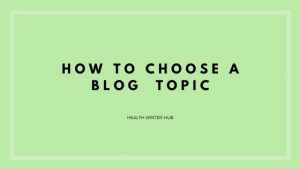 Having the desire to blog is one thing – knowing how to choose a blog topic is something else entirely.
Having the desire to blog is one thing – knowing how to choose a blog topic is something else entirely.
Deciding on a topic for your first blog can be overwhelming.
There are already so many blogs out there, right?
As a health writer, should you blog about writing, business or a health topic?
What content do people want to read, and are you the best person to write that content?
So many questions – luckily, we have the answers. Here are four key considerations to help you determine a suitable topic for your health blog.
Before you choose a blog topic, consider your “why”
The question of why is a good starting point: Why do you want to blog?
Are you blogging to grow your business, network with other writers or inspire behaviour change by sharing your specialty health knowledge?
In other words, what’s the point?
It’s a simple question that requires a simple answer, like:
- Grow my business
- Showcase my skills for my clients
- Get more freelance writing work
- Show clients that I know what I’m talking about
- Boost my website’s SEO
- Become an authority in my field
- Share my health knowledge
- Help others be healthier and live better lives.
Knowing your “why” gives you a sense of purpose and direction. Your why will motivate you when times get tough, and motivation is lacking.
When you know your why, you’re ready to move on to the next consideration: Your target audience.
Who is your blog’s target audience?
Your blog needs an audience. There’s no point writing if you don’t have an audience. Writing content that nobody reads is a surefire way to lose motivation.
Plus, if you don’t know who you’re writing for, how can you help them?
Your audience could be:
- A section of the general public – people impacted by a health topic or disease
- A niche within the medical industry – people working in a medical field
- Clients for your freelance writing business – the companies you’d like to work for
- Other freelance writers – your peers and colleagues.
Before deciding on a blog audience, consider:
- Can I write quality, accurate content about this topic? You should have some experience or expertise in your topic
- Is my audience already reading about my topic? If everyone else in your industry is writing about your topic, it’s best to choose another topic
- Is there enough scope for a blog? Don’t choose a niche that’s too narrow as you may find that your audience isn’t large enough
- Am I passionate about this topic? You must genuinely care about your topic, more than anyone else, if you want your blog to be a success
- Am I dedicated to making a difference through my blog topic? The best blogs are useful, helpful, solve problems and empower readers with actionable tips, so consider your blog topic in this context.
If you’re thinking about choosing a health topic for your blog, your audience would be people who are impacted by that topic, as well as their families and carers.
If you want to write a business blog, then your audience may be your potential clients or other freelance writers.
Those audiences have vastly different needs, so you’ll need to consider who is your primary audience.
You can have a secondary audience, too. For example, people with heart disease (primary) and their families/carers (secondary).
2024 Health Writing Template Package
Save time and create better health content, faster with my new and improved health writing templates!

- Medical News Article Templates
- Health Feature Article Templates
- Health Blog Post Templates
- Article Pitching Template
- Health Blog Post Template
- Health Topic Template
- Medication Topic Template
- Procedures and Treatments Template
- Social Media Templates
- Health Copywriting Project Templates
- Medical Writer CV Templates
Get instant access to all 30+ templates in the package. Download the editable templates and keep them forever!
What blog topics interest your readers?
Blogging 101: Write blog posts that people want to read. Knowing your readers are interested in your content and enjoying your posts is incredibly motivating, too.
So, once you know why you want to blog (goals) and who your audience is (ideal readers), consider what they need to know.
To find out what your audience is interested in, make a list of their:
- Pain points – what are their problems, challenges and struggles, and how can you help them overcome these?
- FAQs – what are their most common questions?
- Interests – who do they follow and what types of stories do they relate to?
If you know where your audience is lurking online, start doing some research.
Look at:
- Questions in online groups – consider the issues your audience members are raising to get a sense of how you can help them
- Comments on Facebook articles and Instagram posts – read the comments on posts that are written for your target audience to see how your readers are reacting to the issues that matter to them
- Popular search terms related to your topic ideas – what are your ideal readers Googling? There are lots of ways to find popular search terms – this post is a good starting point.
What are you passionate about?
An essential step in the process of choosing your blog topic is ensuring the focus reflects your interests and passions. Choose a blog topic you are passionate about – I can’t stress this enough!
When you have a topic in mind, ask yourself: Can you commit to delivering high-quality, useful content about this topic that helps your audience’s needs and makes a difference?
By this point, you have your:
- Why – you know the reason why you are starting a blog
- Audience – you know who your ideal readers are, broadly speaking
- Audience’s pain points – you have some ideas for topics that are useful for your readers.
With the above list sorted, you’ll have a few blog topics kicking around.
To determine which topic is right for you, imagine yourself blogging about these topics for years to come.
Yes, years. Blogging is a long-term project (I started my blog eight years ago!).
To blog consistently, you need to care about your topic and write about it, till death you part.
You’ll know you’ve chosen the right blog topic if:
- The theme aligns with your business or career goals
- You are passionate about the topic
- You can already think of dozens of ideas for blog posts
- Nobody else is blogging about your topic (or doing a good job of it)
- People want to read about your topic
- You’re excited about the prospect of blogging about this topic
- You can see yourself blogging about this topic for months and years
- You feel confident enough to pitch yourself as an authority figure about this topic.
The final piece of the puzzle is to make damn sure you can do an excellent job of writing high-quality blogs on an ongoing basis.
Other points to consider when choosing a blog topic
Hopefully, you now have at least a couple of blog topic ideas.
As you narrow your focus, these questions can help you to find the perfect topic for your blog:
- Social responsibility – is your blog topic going to make the world a better place for your audience?
- Necessity – is there a need for your blog posts? Why/why not?
- Marketing – how will your readers find your posts, and what’s the best way to reach them?
- Success – how will you measure success for you and your readers, and how will you determine if your blog is a worthwhile exercise?
Choosing a blog topic takes time, so don’t rush the process. Think it through, write down your ideas and ask your friends and colleagues what they think, too.
With the right focus and planning, you can choose a blog topic that ticks all the boxes and helps you achieve your writing goals.
Are you in the process of choosing a topic for your blog? What strategies have helped you decide on a topic?
